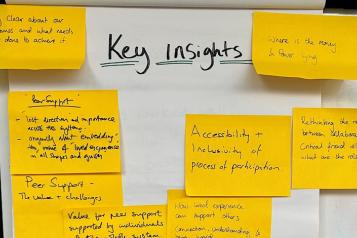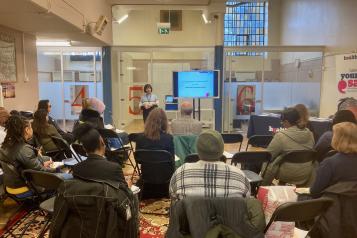Using our research to influence maternity services

Engaging with services and decision makers
This month, our Engagement Manager Natalia presented our findings to The South London Standard Quality Group and the Our Healthier South East London Local Maternity System meeting. The aim was to use our findings to influence the work service deliverers and decision makers do.
At the Our Healthier South East London Local Maternity System meeting, managers, midwives, commissioners and other decision makers working in maternity services across the area got together to share successes so far and discuss ways forward to improve services and better support mothers and children across South East London.
Presenting our findings
Natalia presented our findings, particularly around the issues of:
- Lack of awareness among primary care practitioners on identifying mild to moderate mental health needs
- Lack of awareness of available support services that such mothers can access when in need
She also spoke about the importance of informal support systems for mother’s mental wellbeing, and how doctors should do more to ensure the people who support mothers are involved in care discussions and plans.
What the group said
The Maternity System group said that the findings were useful and in line with issues they had recognized in their work.
For example, issues they face included:
- Long delays in referral of mothers to mental health services
- Short term funding of community support services as a reason for lack of support available
- And not enough awareness among primary care services about mothers’ needs.
They also added:
Staff continuity and relationships with patients are key in maternity services, and that’s why plans should consider both the mental health of patients and professionals – to ensure staff get the support they need to do their jobs well and to encourage staff contunuity.
“Professionals should better engage with the relevant people who are a source of support in a mother’s life” – but how?

“Skills like considering and involving informal support are often seen as “soft” communication skills. But they should instead be seen as core skills that every health professional needs.”
We had a discussion around recommendation 4 from our report– that “Professionals should better engage with the relevant people who are a source of support in a mother’s life.”
People asked for more details on how that should be done, and commented that it is a complex issue and not something clinicians would normally do as part of their work.
We came up with some suggestions, such as clinicians taking time to not just ask “how are you feeling?”, but to also ask questions such as “who are you currently getting support from” in order to understand the context of the mother’s life.
Another practitioner added that:
Skills like considering and involving informal support are often seen as “soft” communication skills, but she said that they shouldn’t actually be seen as “soft” skills for clinicians, and should instead be seen as core skills that everyone needs to incorporate in their work.
We have asked the group to keep us updated about what happens with the findings and recommendations that we presented to them, to let us know what gets taken up and where the barriers might be.
Further engagement with mothers and parents to influence change

Want to share your views? Get in touch!
With this report as a prompt, we are also planning outreach and engagement activities with local mothers and parents’ groups to gather more feedback about services and whether their needs are being met. Having started conversations with the relevant services and decision makers we want to continue gathering feedback and give ongoing support and recommendations to the delivery and restructuring of Lambeth services.
If you or anyone you know wants to give feedback, or if you know a relevant local group whom we should link up with, please get in touch.
Contact us with your views or experience!
Email: info@healthwatchlambeth.org.uk
Text: 07545 211 283
Call: 02072748522


